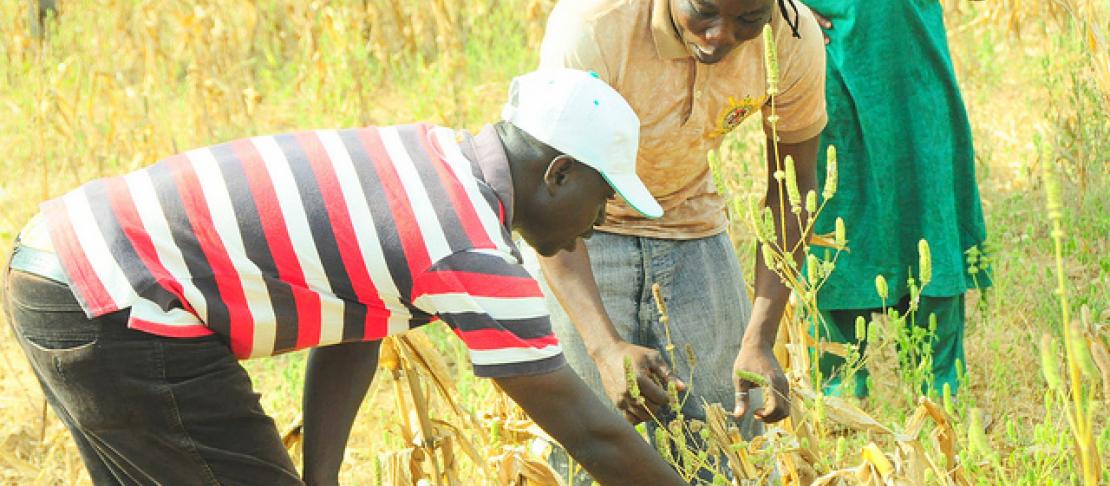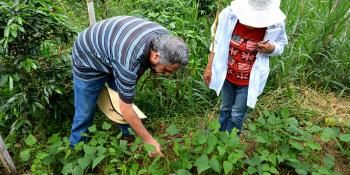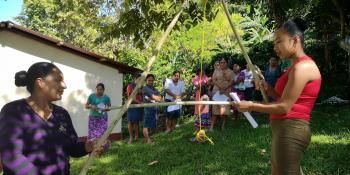Farms of the future: a two-way learning exchange

Usually, during exchange visits between farmers under the "farms of the future" approach, visitors are expected draw on the experience of their hosts. In the case of the exchange visit between farmers of Demonayili and Takorodo villages in Ghana, we witnessed the opposite phenomenon.
Climate change is a threat to agriculture, food security and the livelihoods of small farmers in West Africa. In order to strengthen the adaptive capacities of farmers to this phenomenon, the CGIAR research programme on Climate Change, Agriculture and Food Security (CCAFS) has developed the "farms of the future" approach.
Based on the "similar climate" tool, the "farms of the future" approach helps to connect farmers on a given site to their possible future climate through inter-farmer exchange visits.
The visits provide an opportunity for farmers to learn about the practices and technologies that other farmers use in areas that are similar to the climate's they will soon face. Farmers can then go home and start to implement them on their site and improve their adaptability. This approach has been implemented in all five countries which CCAFS West Africa works within: Burkina Faso, Ghana, Mali, Niger and Senegal.
It is within this context that farmers from Demonayili in Ghana undertook an inter-farmer exchange visit to meet farmers in Takorodo to improve their farming practices in yam cultivation.
Indeed, yam is the main crop in both Demonayili (reference site) and Takorodo (similar site). However, both villages use very different farming practices to grow this crop.
In Demonayili, yam is grown on newly cleared land without using fertilizers (neither organic nor mineral) but using hoes. This practice of intensive farming has reduced soil fertility and justifies clearing more land for growing yam.
In Takorodo, yam is often grown on old maize farms, also without fertilizers but with chemical weed control and using mowing to eliminate stubborn weeds. The use of old farmland to grow yam reflects how saturated space has become in this area where there is little possibility of expanding farmland by clearing.
The failure to use fertilizers in yam cultivation in both villages is due to a belief that the fertilizers would have a negative effect on the conservation of yam tubers. Whether this is a myth or fact is not yet known, but the Council for Scientific and Industrial Research (CSIR/SARI) team in Ghana is currently conducting experiments in Demonayilli village on how fertilization (organic and chemical) effects yam and yam tuber storage to confirm or deny this widely held belief.
The visitors learn from their hosts
In this process of giving and receiving, the visitors learnt that yam can be produced well on old farms, including maize farms. Since maize generally receives fertilization, yam benefits from the after-effects of the fertilization. This helps to improve yields without the use of fertilizers and, above all, it significantly reduces clearing for farming purposes. The visitors are now committed to growing yam on old maize farmlands.

EXPLANATIONS DURING THE EXCHANGE VISIT
PHOTO M. OUEDRAOGO (CCAFS)
The visitors give lessons of best agricultural practices to their hosts
Since the visitors realized that their hosts use many herbicides to control weeds, they requested them to use less of the chemicals because they harm the environment. Furthermore, following the application of herbicides, the hosts use mowing to eliminate stubborn weeds.
The visitors advised them to use hoes to eliminate weeds following the chemical weed control so as to loosen the soil. This improves water retention by the soil and reduces erosion by runoff water. They also advised that herbicides be applied on time for better effectiveness and prevention of its effects on yam.
The exchange showed that while the "farms of the future" approach enables farmers to learn adaptation practices and technologies from people on similar sites, the fact remains that the hosts can also learn lessons from their visitors.
Mathieu Ouédraogo is a Visiting Researcher at CCAFS – West Africa, Jean Sibiri Ouédraogo heads the Agricultural Studies and Research, Environment and Markets Department at INSAH/CILSS and AlhassanLansahAbdulaï is an Agro-Meteorologist at CSIR/SARI.



